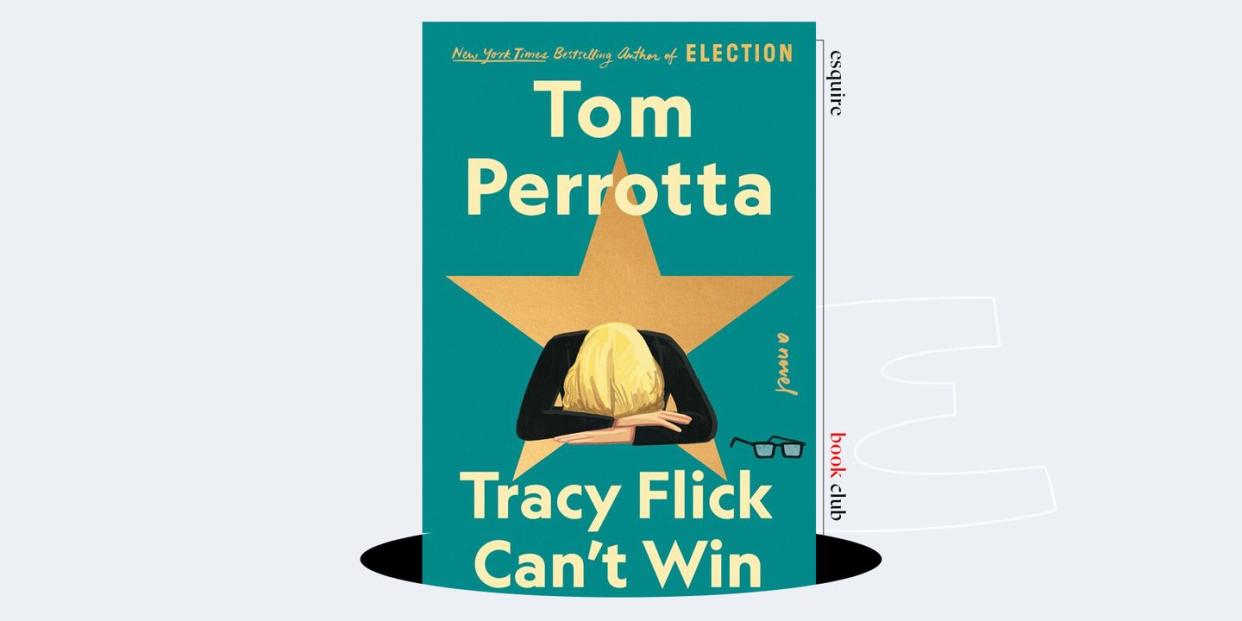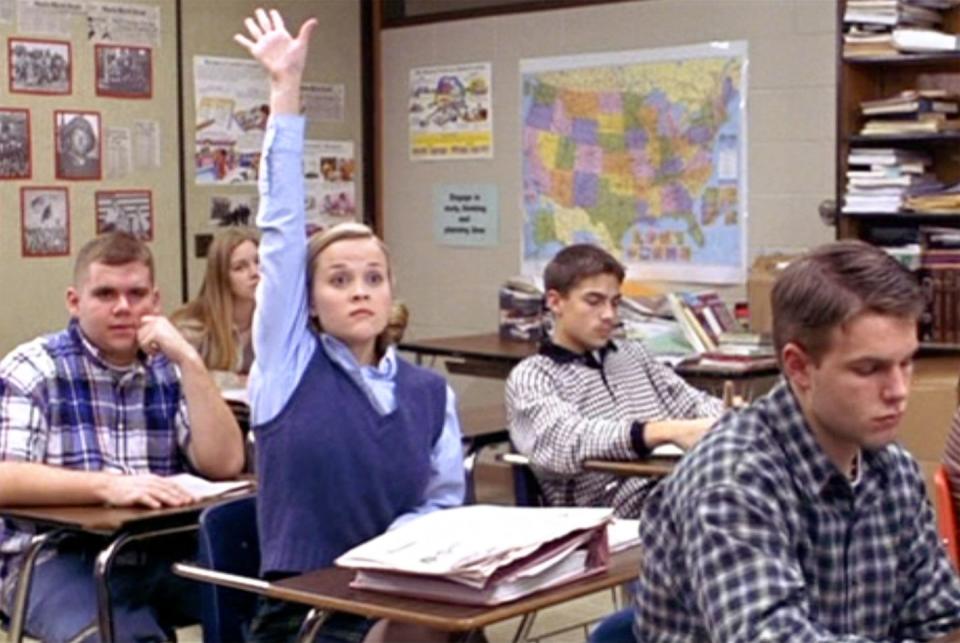We Owe Tracy Flick An Apology

- Oops!Something went wrong.Please try again later.
- Oops!Something went wrong.Please try again later.

How many fictional characters can say that they've starred in a hit film, been profiled in The Washington Post, and lent their name to an enduring pop culture archetype? As far as we know, just the one: Tracy Flick, the hyper-competent heroine of Tom Perrotta's Election. Published in 1998, then lodged into the culture by the 1999 film adaption starring Reese Witherspoon, Election launched driven high school senior Tracy Flick into the public consciousness, where she came to symbolize "utter certitude, complete lack of self-awareness, and mindless ambition," as The Washington Post writes. Now, in a wise and witty new sequel, Perrotta invites us to reconsider Tracy, all while she reconsiders herself.
In Tracy Flick Can't Win, out this week, a forty-something Tracy Flick is ruminating on roads not taken: the #MeToo movement has caused her to question the long-ago sexual encounter with a teacher recounted in Election, while caretaking responsibilities have dashed her law school dreams and led her back to Green Meadow High School as the beleaguered assistant principal. Friendless and frustrated, Tracy looks back on her dream of becoming the first female president with melancholy and regret. “I desperately wanted to go back in time, to find the girl I used to be and tell her how sorry I was for letting her down, that fierce young woman who never had a chance, the one who got crushed," she muses.
With her boss set to retire, Tracy seems like a shoe-in for the top job—but first, she’ll have to overcome the male stakeholders seeking to derail her ascension. She'll also have to navigate the installment of Green Meadow High's Hall of Fame, which intends to honor fallen-from-grace footballer Vito Falcone rather than Tracy's preferred nominees, which include “musicians and astronauts and public servants and stay-at-home moms." Through Vito, Perrotta tells a sharply observed story about American masculinity in decline. "Men like him have a moral innocence to them," he told Esquire. "It’s as if society has told them, 'Hey, go ahead. We’ve got your back. You do something for us by being such a great football player. We'll do something for you by letting you wander blamelessly through the world.'"
Perrotta is the author of ten works of fiction, four of which (Election, Little Children, The Leftovers, and Mrs. Fletcher) have been adapted for the screen. He spoke with Esquire by Zoom to discuss Tracy's second act. This interview has been lightly edited for length and clarity.
Esquire: Where did Tracy Flick Can’t Win begin for you?
Tom Perrotta: It actually didn’t begin with Tracy. I remember going to my editor a few years ago and saying, "I want to write about a middle-aged professional football player, now retired, who has brain damage from concussions and goes back to his hometown to be inducted into a local hall of fame. He finds that all these people he’s hurt are there, demanding an accounting." It felt like such a good metaphor for this moment when masculinity itself was being called into question, and the whole culture was demanding that men apologize for the wrongs they’ve done over the years. Whenever I tried to tell that story, I found myself writing it in the oral history, multiple narrator format of Election. At first, it made me uncomfortable. I don't want to plagiarize myself. Why am I acting like I'm writing Election again? But I couldn’t find my way out of it. Suddenly it was as if Tracy popped up and said, “I'm part of this.” I could just see where she belonged. It had been almost thirty years since I put her name on paper, and it felt like she was still right there, after all this time.
Over the years, people have wondered out loud, “What would Tracy Flick be doing?” Some would say, “She’s going to be running for president,” or, “She’s conquering the world in some other way.” But that never felt quite right to me. It was so hard for her just to be elected the president of her high school, so I couldn't imagine how she's going to conquer the world. Then I realized, “She's still in that high school, and she's still fighting for every inch of ground.” Then I knew: there’s Tracy.
ESQ: What is it about Tracy that makes the people around her so uncomfortable? Why does she have to fight so hard to gain an inch of ground?
TP: My feeling is that everybody who decides to go for the brass ring—especially everybody from nowhere—looks a little crazy. Think about Richard Nixon saying, “I'm going to be president,” as opposed to somebody like John F. Kennedy, who had all the advantages. There’s that moment when all they have is that self-belief. Most of the time that self-belief doesn't pan out, but you can't get anywhere without it. I don't mock Tracy for that. I think that’s absolutely the one thing she would need to start down that road.
The Election movie did play a little bit at her expense, but in the way that fiercely ambitious people sometimes seem ridiculous to their peers. I grew up in a culture that said you should wear your ambition lightly. I think that was a laid back ‘70s thing. When the ‘80s rolled around, there was much more openness about ambition. Now social media has only increased people’s desire to promote themselves 24/7. But I do think that ambitious people still make those around them uncomfortable. Until Tracy's generation, there were very few women politicians. Someone like Tracy is of the first generation where a girl could say, “I'm going to be president,” and her mother might say, “You can do it. There's no reason why you can't.” People were threatened by the appearance of these girl warriors who said, “I'm in the game now.” Nobody likes it when there are suddenly more opponents in the game.

ESQ: In the decades since Election came out, Tracy has taken on a life of her own in popular culture. The name Tracy Flick has become a misogynist shorthand for an ambitious, independent, vocal woman. How do you feel about the way our culture has latched onto Tracy?
TP: On the one hand, it's an amazing experience for a writer, because literary writing has become a bit marginal to the culture. Obviously Tracy became an icon because of Reese Witherspoon's performance in the film, but nonetheless, it was like this character that I created then took on a life of her own. That was very gratifying for me. Part of my goal as a writer that my stories would spark some conversation. This was a case where that happened.
That said, early on, I sensed that people were using Tracy to attack or mock the idea of an ambitious, willful, powerful young woman. It was an anti-feminist stereotype. So I was really pleased when a new debate broke out about ten years ago. Rebecca Traister and A. O. Scott, among others, were writing pieces saying, “Tracy Flick is not the bad guy. Tracy Flick is the hero of this movie.” We’re talking about a teenage girl who is the victim of a teacher who tampers with an election. Why is she the villain? One teacher took advantage of her sexually, and another teacher tried to cheat her out of her rightful victory. Sure, she has a temper. She lies to cover up the fact that she ripped up some posters. It all seems very much like minor, forgivable teenage offenses, not something she needs to be scorned and punished for.
ESQ: One of the most moving things about this new novel is Tracy’s process of reconsidering what happened to her. In Election, Tracy insists that she's in control. But in Tracy Flick Can't Win, she's less certain. She says, "It gnawed at me that summer, the possibility that I'd misjudged my own past." Meanwhile, the powerful men in her community are being held to account for their abuses of power. At what point in the drafting process did this cultural lens of the #MeToo movement come into play?
TP: In the very first chapter, Tracy addresses this question, but it was actually the last thing I wrote. My editor read the early draft and said, “This book has Tracy Flick in the title. Maybe it should begin with Tracy." I actually began with the principal stepping down, creating this vacancy that Tracy was going to compete. But my editor was right: Tracy should have the first word.
The book begins with Tracy reading an article about a teacher at a prep school who’s been exposed as a serial abuser. Some of the women accusing him are Tracy's age, and their testimonies make Tracy very uncomfortable, because she's always clung to this idea that she was a unique and exceptional person, and that's why this relationship happened. She just said, "I wasn't an ordinary high school girl. I was an adult before my time. This teacher recognized that and spoke to me in the way that I wanted to be spoken to." But now, she realizes, “Maybe I’m not special. Maybe I was manipulated or groomed in the way that these other girls were.” She resists that for as long as she can, but her past keeps pressing back on her. She doesn't want to think of herself as a victim, but she’s realizing, “Maybe these forces have been arrayed against me for my whole life, and I'm one of a larger group.”
ESQ: There’s a moment when Tracy says, "Being president was my ambition, not my dream. There's a difference." What’s the difference there?
TP: I can dream about being a professional baseball player, but I know it's not going to happen. But an ambition is a dream that you build your life around—one that you work for and believe can be manifested in your life. An ambition is a dream that can come true. Otherwise, it's just a fantasy. That was Tracy's way of saying that she truly believed in her heart that she could do it. If you don’t believe it, there's no chance it’ll happen.
ESQ: How has your own relationship to ambition changed throughout your life?
TP: When I wrote Election, I thought I was going to give bits and pieces of myself to these characters, especially the women characters. I was worried that I didn’t have the authority or knowledge to write about these women. Take Tammy for example—she’s the anarchist character who says, “Let’s just forget about this stupid election.” I had that wise guy attitude when I was in high school, but some other part of me was like Tracy, because I knew that I wanted to be a writer even then. I kept that dream close inside me.
I grew up in a blue collar world where people weren't writers. I didn't really know a writer until I took creative writing classes in college. I knew this was what I wanted, but if I told anybody, they would’ve laughed at me, because they didn't know anything about. It didn't seem that people like us would be able to do that on the scale that I wanted to do it. Later, I remember watching an episode of Mad Men after I’d started doing some screenwriting, and thinking, “I want to be part of this TV world. Something exciting is happening here.” Because my ambition to be a writer had come true, and I had really struggled to get there, I remember having this new ambition. I've been very lucky to have made these two things happen that were once private ambitions. But I do think it's one of the reasons why I identify so closely with Tracy. I know what it feels like to be privately vowing to yourself, “I'm going to do this. Whatever it takes to get there, I'm going to figure out what that is and work my way to it.”
ESQ: You mentioned earlier that this all started with Vito Falcone, the football player returning to his hometown. Vito is a figure of male greatness in decline. What does his story have to tell us about the state of masculinity in America?
TP: In the past few years, so many men who were seen as powerful got knocked off their pedestals. There was this sense that a long-deferred reckoning had suddenly happened. I think a lot of men suddenly felt like they were in the hot seat, and they had to do a moral accounting that they had put off for a long time. Toxic masculinity is still a powerful force, but that was a really striking moment when it seemed like men were being judged for things they hadn't felt guilty about. I heard a lot of men saying, “I had to go back through my whole sexual history with this new lens, and I'm not as guiltless as I like to think I am.” Men feel scrutinized, and some of them really resent that. Others are using it as an opportunity for a moral inventory. Some, like Vito, have gotten to the point of knowing that they've sinned and are trying to figure out how to make it right.
I think that's why he's a touching figure. Vito, by any account, is an asshole. He's done lots of awful things. The first time we meet him, we watch him do something that's unforgivable. He hits bottom, then has to reckon with rebuilding himself. Men like him have a moral innocence to them—it’s as if society has told them, “Hey, go ahead. We’ve got your back. You do something for us by being such a great football player. We'll do something for you by letting you wander blamelessly through the world. If you hurt a few people along the way and get a few girls pregnant, we won’t stop you.” But I also found him quite moving. He meets a woman in recovery and he treats her with real kindness and care, along with the wisdom that comes to people who have wrecked their lives and are trying to rebuild.
ESQ: Are you able to share any film adaptation news about Tracy Flick Can’t Win?
TP: All I can say is that the conversations are happening. I think one of the peculiarities of writing a sequel is that Paramount made the original movie, so no one can make a movie with Tracy Flick except Paramount. Everybody is inclined to do it. It's really just that a Hollywood deal has to be made.
I will say this: the movie Election was a box office flop when it came out, but it was a critical favorite. Its reputation has only increased over the years, it still gets screened all the time, and Tracy has become a buzzword. But I don't know that Paramount ever thought of it as a really successful movie. I think they understand that there's a legacy to it, and I Reese's star has only grown and grown in those years, but perhaps there's a little disjunction between the way the creative people see it and the way that the money people see it.
ESQ: Are you done with Tracy, or is there potential for a trilogy here?
TP: There’s a weird logic to trilogies, isn’t there? I like the idea that she's grinding her way forward, always at a great cost. I used to just say, “No, I have no interest. When I'm done with the book, I'm done with the book.” But there was something so interesting and exhilarating about returning to this character after all these years. I'm a huge fan of John Updike's Rabbitbooks—there’s almost one per decade. I love the way they reveal so much about not just the course of one life, but the course of national life. Rabbit is very attuned to the cultural context of the moment.
Putting Election and Tracy Flick Can’t Win side by side reveals such a sweep of history. It reveals so many changes in the way that ambitious women are looked at in the culture and the way we reckon with men who abuse their authority. Tracy changes so much between 16 and her mid-forties. I assume that to add another book would reveal even more, but I think I'll let some time pass before I really give it serious thought.
You Might Also Like

